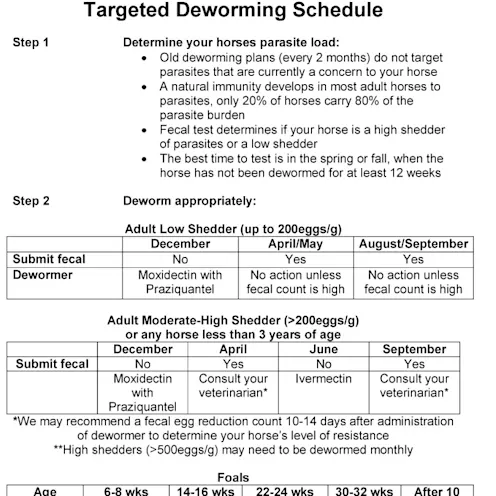Massachusetts Equine Clinic
We have two tiers of de-wormers: short acting such as Pyrantel Pamoate (Strongid), Fenbendazole/Oxibendazole (Panacur/Anthelcide) and long acting: Ivermectin/Moxidectin (Equimax/Quest). There is a large resistance to the short acting de-wormers and a growing resistance to the long acting ones. Our goal is to limit the use of de-wormers, especially the long acting ones, while maintaining your horse’s health.
To determine which de-wormer is needed, a fecal sample is taken. The sample is analyzed in such a manner as to determine how many worm eggs are in one gram of manure. A good sample is fresh, enclosed in a bag with minimal air, kept cool, and analyzed within 48 hours of collection. Some samples are taken to determine shedding status; others are taken to test the effectiveness of a de-wormer. Horses are placed into three categories: Low (0-200 epg), Moderate (225-475), and High (500+) shedders. Low shedders can be de-wormed once or twice annually, Moderate 3-4 times, and High shedders most frequently.
With all de-worming strategies, the most important aspect is removal of manure. Ideally, paddocks are picked daily or at least twice weekly. Unfortunately, this is not always possible and pastureland that has long housed horses can have high egg counts. How is it possible that some horses have persistent negative or low fecal when in the same field with horses shedding greater than 500 eggs/gram? The answer is that each horse has the ability to clear parasites from their system. Some are better than others, and paradoxically, high shedding horses frequently do not exhibit clinical signs of being full of worms, such as thin, poor haircoat etc. Shedding status falls along a bell curve.
For example: In a paddock full of 100 horses: 30 will be low shedders, 40 will be moderate, 30 will be high. Since it is impossible to remove every parasite from every field, the idea of targeted de-worming is to populate the fields with easy to kill parasites aka the refugia. The way to do this is to limit use of de-wormers, especially the higher tier or longer acting de-wormers.
The goal of targeted de-wormer should absolutely not compromise the health of any individual horse. With judicious use of de-wormers we are prolonging the health of future generations of horses.


